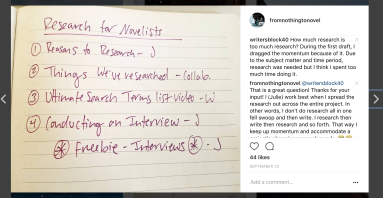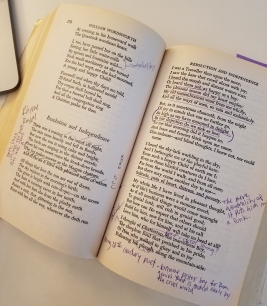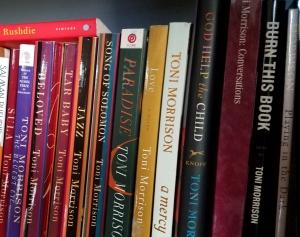
Last week one of our amazing Instagram writing friends asked us a REALLY GREAT question about researching–when should you stop researching and start writing, or how much is too much research?
Julie’s answer to her was that she didn’t separate her writing and research into two separate phases of the novel-writing process, but rather, she researched as the need arose, alongside her writing. This way, she never got bogged down by research and she was always stretching and exercising those writing muscles.

Julie’s strategy here is perfect in its simplicity–don’t let research keep you from writing; instead, conduct research alongside your writing. Brilliant.
But our Instagram friend’s question and Julie’s answer reminded me of my own struggles with the symbiotic but sometimes antagonistic relationship between research and writing as a green first-year Ph.D. student. Here, I recount those struggles for you, revealing ultimately what I learned about balancing research and writing. So, without further ado, here are the…
Tales of a Research Newbie

My Master’s program was small but awesome. I loved my fellow students, my professors, and the material. I felt challenged and I learned. Perfect! But one thing we didn’t do a ton of was research. Close reading was the name of the game in that program, so when I arrived on a totally different campus in a totally different state in a Ph.D. program, I felt a bit out of my league.
But you don’t show your weaknesses in grad school. Never let ’em see the fear in your eyes and all that. So I snuck into my Toni Morrison seminar every week, pretending that I knew what I was doing, and then camped out in a library carrel every day teaching myself to swim in the labyrinths of online databases, special collections, floors and floors of stacks, and the infinitely deep and mostly unexplored darkness of the internet.
Me and Toni, we got to know each other pretty well. To write my seminar paper for the class, I read every book the school owned by her and on her in our library’s limited collection. I bought my own copies, ordered more from Interlibrary loan. I then expanded my exploration to African American literature in general and, finally, moved on to read as much as I could in the university’s much larger collection of works on and by poet William Blake.
It was a strange paper I was writing … or, rather, not writing. Consumed with research, I hadn’t yet written a single word. Therein lied my true problem. My research skills weren’t messing me up; my refusal to start writing was my major hurdle.

Completely unsure of my own research abilities, I had set out to learn EVERYTHING, and by the time I sat down for a conference with my brilliant, poised, and intimidating professor to update her on the status of my project, I had nothing.
Not. One. Word on this totally strange paper exploring William Blake’s concepts of “innocence” and “experience” in Toni Morrison’s Tar Baby. The thesis itself was crazy and the paper as a whole would need a lot of time to finesse. And yet there I was, researching when I should have been writing.
My brilliant professor’s words to me are what flashed through my memory when I read the Instagram exchange last week:
“You’ve got to write. Just write.”
You can keep researching, she told me, but at some point you have to tell yourself,
“Maybe I don’t know everything I need to know right now, but I need to process what I do know by writing about it.”
Here’s the true problem I had created for myself by letting my research distract me from my writing: I had told myself I didn’t know enough, that I knew nothing! Thus, I would research to find out as much as I could.
I had forgotten that as a close reader I still had things to say, even without the research. My excessive research had been driven by fears and insecurities and, most of all, my rabid case of imposter syndrome.
After this class and this paper, I flipped my paper-writing strategy. I wrote first–jotting down my impressions, articulating my own interpretations of the literature itself, and then I delved into research, letting it guide how I added more words to the paper and revised the ones I had already written. My process became:
- Write first
- Research second
- Never stop writing
I’m not saying that I shouldn’t have researched my subject as thoroughly as I did. Thorough research is not the problem, LEARNING all that stuff is never a problem (unless you have a deadline, but that’s another post for another day). The problem was that I had forgotten that my words and impressions were as valuable as the research I was conducting.
I still use this process as a fiction writer now, and it hasn’t yet failed me. Research is important, y’all, but we’re writers, so get writing!
What are your research stories? Tell us in the comments!
And, if you want more thoughts on research, check out Whitney’s favorite strategy for finding what you need to know through Google!

I love your three steps! It’s so true to write first and research latter! Thanks for sharing! xxx
LikeLiked by 1 person
Glad you liked it!
LikeLiked by 1 person
I think these are fabulous tips. I especially feel this way when writing a new blog post. I don’t always know the answer or where it’s going, but I don’t stop writing.
LikeLiked by 1 person
Yes! It’s definitely appropriate for blog writing! Just keep writing *sung in Dory’s voice*.
LikeLike
These are such great tips! I love the approach of letting writing & research balance each other out
LikeLiked by 1 person
Thanks, Alison!
LikeLike
Such great tips! I love the idea of incorporating the steps together. I think this is a beautiful way of approaching a novel!
LikeLiked by 1 person
Thank you!
LikeLike
I definitely follow this approach. The story evolves so it makes sense right?
LikeLiked by 1 person
Exactly, Julie! You find new things to research as you write!
LikeLike